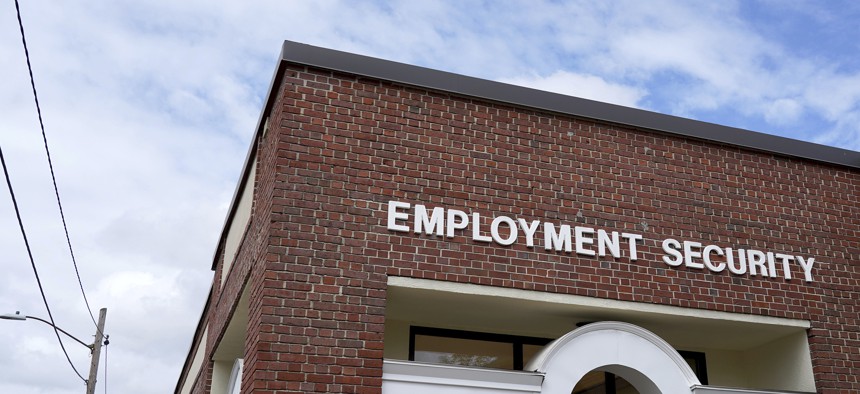States Borrowed Billions to Pay Unemployment Benefits. Soon Interest is Due.

A New Hampshire Works employment security job center is seen Monday, May 10, 2021, in Manchester, N.H. AP Photo/Mary Schwalm
Fourteen states owe $54 billion to the federal government for loans to keep unemployment trust funds solvent during the pandemic.
States borrowed billions of dollars from the federal government to cover the cost of unemployment compensation during the coronavirus pandemic. They’re about to owe interest, which when tacked on could significantly increase the amount they must repay.
When states exhaust their unemployment trust funds, they are allowed to borrow money from the federal government to ensure benefits continue to be paid. With upwards of 100 million initial jobless claims filed over the course of the pandemic so far, state unemployment systems were stretched to the max.
Twenty-two states took out what are referred to as Title XII advances during 2020. Thus far, the loans have been interest-free, but starting Sept. 6, states with outstanding loans will begin to accrue 2.3% interest on the borrowed sums.
Some states have paid back the money using federal covid relief money but 14 states owe approximately $54 billion, according to the latest data from the Treasury Department. There’s been some discussion—but no movement—at the congressional level to defer interest for longer.
The U.S. Chamber of Commerce wrote to lawmakers last year asking, among other things, that the Title XII advances be interest free through 2021 and that Congress consider loan forgiveness options for states.
The National Association of State Workforce Agencies similarly asked lawmakers this year to divert the accrual of interest through 2022.
“With extreme claim loads, many states are borrowing in order to make UI payments,” the association wrote. “Given the continued economic stress, all state workforce agencies agree that a continued moratorium on interest accrual and payments is critical in order to avoid significant increased taxes and assessments on employers.”
There is precedent for suspending interest collection. After the Great Recession, Congress delayed the accrual of interest on Title XII advances for two years, said Robert Pavosevich, a retired lead actuary for the Labor Department’s Office of Unemployment Insurance. Even with that delay, 29 states paid $3.8 billion in interest on borrowed funds that were repaid between 2011 and 2018, according to Treasury Department data.
California borrowed $23 billion from the federal government to pay unemployment benefits during the pandemic. The state’s Legislative Analyst’s Office recently estimated the state would owe about $500 million in 2022 and could pay a total of $2.5 billion to $5.2 billion in interest on the loans depending on future unemployment and interest rates.
Suspension of interest would require an act of Congress, and it’s unlikely that legislation to do so would pass before Sept. 6, said Michele Evermore, a senior policy analyst on unemployment insurance at the Department of Labor.
Other Concerns for States
Interest isn’t the only financial concern for states that borrowed large sums to keep their unemployment benefits going. Unemployment is paid for through taxes states levy on businesses. When unemployment trust funds are depleted, state and federal laws trigger higher business tax rates on employers to replenish the funds.
States that borrowed money to keep unemployment trust funds solvent will likely incur significant tax hikes on businesses if they don’t find a way to quickly repay the borrowed money, said Jared Walczak, vice president of state projects at the Tax Foundation.
Some states have used CARES Act funding, or are contemplating use of ARPA funding, to pay back borrowed unemployment funds.
Delaware, for example, borrowed nearly $33 million to pay unemployment benefits in 2020 but used CARES Act funding to pay the money back, according to the Department of Labor.
Indiana used $400 million in CARES Act funding to pay back Title XII advances. State lawmakers also approved a budget this year that directs $500 million in ARPA money to be used to replenish the state’s unemployment trust fund.
“The federal government is throwing a lifeline here and a chance to reset the funds,” Walczak said of states’ ability to use federal covid relief funds on unemployment costs. “That’s an opportunity states have never had before to wipe out the costs associated with an economic recession and to get ahead of the cycle.”
Andrea Noble is a staff correspondent with Route Fifty.
NEXT STORY: Calling All Unvaccinated Nurses: This State Will Hire You





